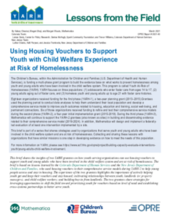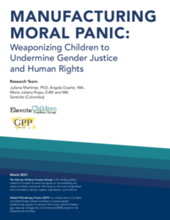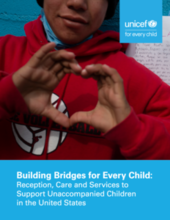This page contains documents and other resources related to children's care in the Americas. Browse resources by region, country, or category.
Displaying 531 - 540 of 3191
This study describes the challenges faced by a child protection agency and community organization who partnered to reduce the overrepresentation of Black children reported to the child protection agency through implementation of a parenting support program.
This article exploresthe extent to which general strain theory (GST) and self-control theory can explain the mental health outcomes of youth in-care.
This brief is part of a series that shares strategies used by organizations that serve youth and young adults who have been involved in the child welfare system and are at risk of homelessness. It examines a multi-phase grant program to build the evidence base on what works to prevent homelessness among youth and young adults who have been involved in the child welfare system in the U.S.
This mixed-methods study used an integrated approach to investigate the drivers that impact the transition from student to child welfare professional and factors that motivated a highly trained cohort of child welfare professionals to stay or leave the child welfare workforce (post one–year employment).
This report explores how gender-restrictive groups are using child protection rhetoric to manufacture moral panic and mobilize against human rights, and how this strengthens the illiberal politics currently undermining democracies.
The current study utilized survey data to determine if respondent characteristics and inter‐rater agreement on measures of important relationships were associated with resilience among child welfare‐involved youth.
This study addresses a gap in the literature regarding older youth with intellectual disabilities who are sexually victimized and pushed to engage in transactional sex while they are transitioning from child welfare systems involvement. It does so by examining risk and protective factors at the individual, micro, exo, and macro systems levels.
UNICEF’s new report, Building Bridges for Every Child: Reception, Care and Services to Support Unaccompanied Children in the United States, considers global discussions on adequate reception and care for unaccompanied migrant and asylum-seeking children. Following the journey of children traveling alone from northern Central America to the U.S. – entering, navigating and leaving the U.S. reception and care system and transitioning to community life – this report presents eight overarching recommendations for the realization of a better and more equitable system of care and support for every child.
"The lawyers working to reunite immigrant parents and children separated [from their families] by the Trump administration reported Wednesday that they have found the parents of 105 children in the past month," according to this article from NBC News.
This article from the Conversation puts a spotlight on the situation of young people aging out of the child welfare system in Ontario, Canada during the COVID-19 pandemic.




